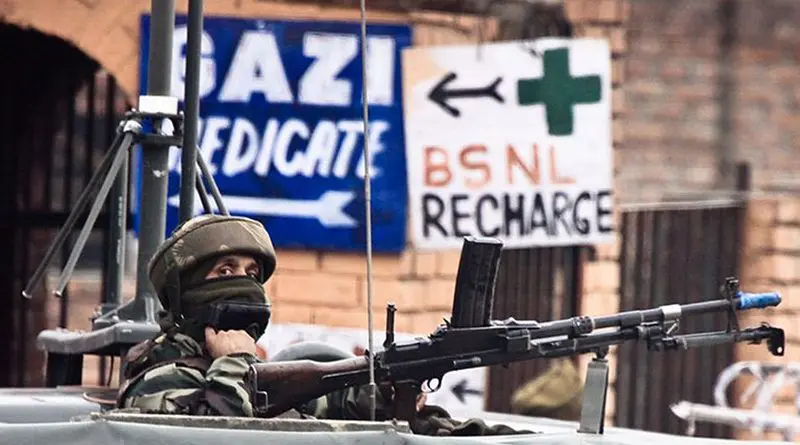India Removes Kashmir’s Decades-Old Special Status Amid Massive Security Clampdown
By VOA
By Anjana Pasricha
In a far-reaching move, India’s Hindu nationalist government has scrapped the special autonomous status given to Kashmir for decades, sparking fears of a backlash in its only Muslim-majority region.
Hours after a massive security clampdown in the state, Home Minister Amit Shah told parliament Monday that the president had signed a decree abolishing Article 370. The measure allowed the state to make its own laws and have independence over all matters except foreign affairs, defense and communications.
India’s government also lifted a ban on property purchases in Kashmir by non-residents, allowing Indians from outside the state to settle there, buy land and hold local government jobs.
Pakistani Prime Minister Imran Khan said the move “was in clear violation” of U.N. Security Council resolutions, according to a statement released after a telephone call with Malaysian Prime Minister Mahathir Mohamad on Monday evening.
Kashmir is divided between India and Pakistan, but claimed in full by both. It has been the trigger for two of the three wars between the countries and remains a source of tension.
Pakistan’s Foreign Ministry said in a statement, “No unilateral step by the Government of India can change this disputed status, as enshrined in the United Nations Security Council (UNSC) resolutions. As the party to this international dispute, Pakistan will exercise all possible options to counter the illegal steps.”
United Nations Secretary-General Antonio Guterres Monday urged India and Pakistan to “exercise restraint” following India’s announcement, according to U.N. spokesman Stephane Dujarric.
The spokesman added that U.N. peacekeepers observing a cease-fire between India and Pakistan in Kashmir have “observed and reported an increase in military activity along the Line of Control” — the de facto border separating Pakistani and Indian portions of the disputed Himalayan territory.
U.S. State Department spokesman Morgan Ortagus said the United States is “closely following the events in the state of Jammu and Kashmir.”
“We are concerned about reports of detentions … and call on all parties to maintain peace and stability along the Line of Control,” he said.
The U.S. embassy in New Delhi issued a security alert Monday, urging Americans to leave Kashmir “as soon as possible,” citing the “potential for terrorist incidents, as well as violent public unrest.”
Shah’s announcement was also met with massive protests in New Delhi from India’s opposition parties, which criticized the move as “unconstitutional.”
In Pakistan, protests took place in the capital, Islamabad, and the southern commercial center of Karachi.
The new measures would effectively put New Delhi in charge of the violence-scarred region, which since 1989 has witnessed a separatist uprising that has left tens of thousands dead.
More troops were airlifted to the state, where 10,000 additional paramilitary forces were deployed last week as speculation and uncertainty mounted over an impending announcement on Kashmir’s special status.
Indian Prime Minister Narendra Modi’s Bharatiya Janata Party has long asserted that special provisions for Kashmir should be scrapped so that the region can be integrated with the rest of India. The party’s lawmakers hailed the decision as “historic.”
Local Kashmiri politicians, who had warned against such a step, slammed the move and vowed to protect the region’s “identity.” They fear that opening up the state to people from the rest of the country could change the demography of India’s only Muslim majority region. Muslims make up more than two-thirds of the population.
The head of the National Conference party in Kashmir, Omar Abdullah, called it “an aggression against people of J&K [Jammu and Kashmir]” and said the government had resorted to “stealth.” He was one of the three leaders placed under house arrest in Kashmir’s capital, Srinagar, hours ahead of the controversial announcement.
A former chief minister of the state, Mehbooba Mufti, said the government’s decision would make India an occupational force there and have catastrophic consequences.
A Congress Party leader from Kashmir, Ghulam Nabi Azad, said scrapping laws would not achieve integration because people’s trust had been betrayed instead of being won.
Hours ahead of the announcement, Kashmir was in a virtual lockdown with internet services suspended, restrictions placed on public movements, educational institutions shut and visitors and pilgrims evacuated. Thousands more troops were ordered into the region.
In recent days, authorities asked pilgrims and tourists to leave the region. As panic spread, residents stocked up on food and gasoline.
The government also plans to split the state into two federal territories consisting of Jammu and Kashmir and the Buddhist region of Ladakh.
While Prime Minister Modi is likely to get public support for the move, it is likely to be subjected to legal challenges. Several political analysts also expressed fear it would further alienate a region which has witnessed an armed rebellion by Islamic militants fighting for either independence or its merger with Pakistan.
“What cannot be changed in the enmity that is being created between Hindus and Muslims in the Valley,” said Neelanjan Sircar, an independent analyst in New Delhi. “Is it a situation where the region can only persist under heavy military occupation? Can we really ever envision a time where all troops will be pulled out and everyone will get along peacefully? I don’t see that today.”
Ayaz Gul in Islamabad, Nike Ching at the State Department contributed.

